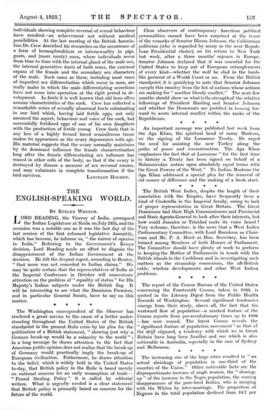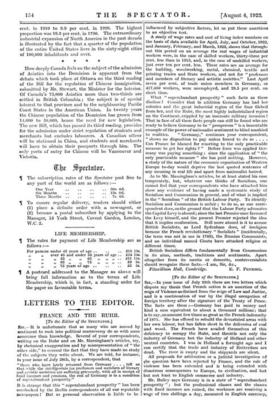THE
ENGLISH-SPEAKING WORLD.
BY EVELYN WRENCH.
r _ORD READING, the Viceroy of India, prorogued the Indian Legislature at Simla on July 28th, and the occasion was a notable one as it was the last day of the last session of the first reformed legislative Assembly, which has become, he informs us, " the mirror of opinion in India." Referring to the Government's Kenya decision, Lord Reading made no effort to disguise the disappointment of the Indian Government at the decision. He felt the deepest regret, according to Reuter, " that more was not conceded to Indian claims." We may be quite certain that the representatives of India at the Imperial Conference in October will concentrate attention on the problem of " equality of status " for Hls Majesty's Indian subjects under the British flag. It will be interesting to see what the Dominion Premiers, and in particular General Smuts, have to say on this matter. * * * * The Washington correspondent of the Observer has rendered a great service to the cause of a better under- standing throughout the United States of the British standpoint in the present Ruhr crisis by his plea for the publication of a British statement, " showing just why a German break-up would be a calamity to the world " ; in a long message he draws attention to the fact that American public opinion does not realize that the break-up of Germany would practically imply the break-up of European civilization. Futhermore, he draws attention to the belief, which is widely held in the United States to-day, that British policy in the Ruhr is based merely on national concern for an early resumption of trade- " Pound Sterling Policy " it is called by editorial writers. What is urgently needed is a clear statement that British policy is primarily based on concern for the future of the world. Close observers of contemporary American political personalities cannot have been surprised at the tenor of the remarks of Senator Hiram Johnson, the Californian politician (who is regarded by many as the next Repub- lican Presidential choice), on his return to New York last week, after a three months' sojourn in Europe. Senator Johnson declared that it was essential for the United States to keep out of European entanglements of every kind—whether the wolf be clad in the lamb- like garment of a World Court or no. From the British standpoint it is gratifying to note that Senator Johnson excepts this country from the list of nations whose actions are making for " another bloody conflict." The next few months should show us what is the strength of the relative followings of President Harding and Senator Johnson and whether the Democrats are justified in looking for- ward to acute internal conflict within the ranks of the Republicans. * * * * An important message was published last week from the Aga Khan, the spiritual head of many Moslems, on the signing of the Lausanne Treaty. He urged the need for assisting the new Turkey along the paths of peace and reconstruction. The Aga Khan emphasizes the fact that at Lausanne " for the first time in history a Treaty has been signed on behalf of a Mohammedan nation upon absolutely equal terms with the Great Powers of the West." To Indian Moslems the Aga Khan addressed a special plea for the removal of old causes of difference and the making of a fresh start.
The British West Indies, despite the length of their association with the Empire, have frequently been a kind of Cinderella in the Imperial family, owing to lack of proper representation in Great Britain. The Great Dominions had their High Commissioners and Provincial and State Agents-General to look after their interests, but how could Jamaica or Trinidad make its voice heard ? Very welcome, therefore, is the news that a West Indies Parliamentary Committee, with Lord Burnham as Chair- man and Mr. P. A. Hurd as Hon. Secretary, has been formed among Members of both Houses of Parliament. The Committee should have plenty of work to perform in keeping the Mother of Parliaments in touch with the British islands in the Caribbean and in investigating such matters as the steamship connexions, the all-British cable, wireless developments and other West Indian problems. * * The report of the Census Bureau of the United States concerning the Fourteenth Census, taken in 1920, is quoted in the Literary Digest from the Public Health Records of Washington. Several significant tendencies emerge from their study, above all, the fact that the westward flow of population—a marked feature of the Census reports from pre-revolutionary times up to 1900 —has now ceased. The latest Census reveals the " significant feature of population movement" as that of the drift cityward, a tendency with which we in Great Britain have long been familiar and one which is also noticeable in Australia, especially in the case of Sydney and Melbourne.
The increasing size of the large cities resulted in " an actual shrinkage of population in one-third of the counties of the Union." Other noticeable facts are the disproportionate increase of single women, the " slowing- up " of the increase in the Negro population, the coming disappearance of the pure-bred Indian, who is merging with the Whites by inter-marriage. The proportion of Negroes in the total population declined from 10.7 per cent. in 1910 to 9.9 per cent. in 1920. The highest proportion was 19.3 per cent. in 1790. The extraordinary industrial expansion of North America in the past decade is illustrated by the fact that a quarter of the population of the entire United States lives in the sixty-eight cities of 100,000 inhabitants and over.
* * How deeply Canada feels on the subject of the admission of Asiatics into the Dominion is apparent from the debate which took place at Ottawa on the third reading of the Bill for the regulation of Chinese immigration, submitted by Mr. Stewart, the Minister for the Interior. Of Canada's 75,000 Asiatics more than two-thirds are settled in British Columbia ; the subject is of special interest to that province and to the neighbouring Pacific Coast States in the American Union. In twenty years the Chinese population of the Dominion has grown from 14,000 to 58,000, hence the need for new legislation. The new Bill, which has passed its third reading, provides for the admission under strict regulation of students and merchants but excludes labourers. A Canadian officer will be stationed in China, and students and merchants will have to obtain their passports through him. The only ports of entry for Chinese will be Vancouver and Victoria.



































 Previous page
Previous page